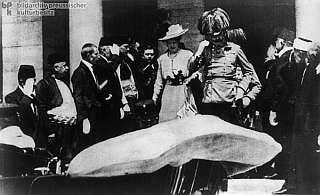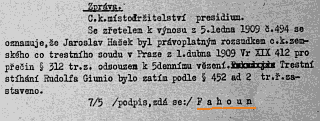
Franz Ferdinand and his wife Sophie leave the Sarajevo Town Hall on 28 June 1914, five minutes before the assassination.
The Good Soldier Švejk is a novel with an unusually rich array of characters. In addition to the many who directly form part of the plot, a large number of fictional and real people (and animals) are mentioned; either through the narrative, Švejk's anecdotes, or indirectly through words and expressions.
This web page contains short write-ups on the people that the novel refers to; from Napoléon in the introduction to Hauptmann Ságner in the last few lines of the unfinished Part Four. The list is sorted in the order of which the names first appear. The chapter headlines are from Zenny Sadlon's recent translation (1999-2024) and will in most cases differ from Cecil Parrott's version from 1973.
The quotes in Czech are copied from the on-line version of The Good Soldier Švejk: provided by Jaroslav Šerák and contain links to the relevant chapter. The toolbar has links for direct access to Wikipedia, Google maps, Google search, svejkmuseum.cz and the novel on-line.
The names are coloured according to their role in the novel, illustrated by the following examples:
- Dr. Grünstein as a fictional character who is directly involved in the plot.
- Fähnrich Dauerling as a fictional character who is not part of the plot.
- Heinrich Heine as a historical person.
Note that a number of seemingly fictional characters are inspired by living persons. Examples are Oberleutnant Lukáš, Major Wenzl and many others. This are still listed as fictional because they are literary creations that are only partly inspired by their like-sounding "models".
Military ranks and some other titles related to Austrian officialdom are given in German, and in line with the terms used at the time (explanations in English are provided as tooltips). This means that Captain Ságner is still referred to as Hauptmann although the term is now obsolete, having been replaced by Kapitän. Civilian titles denoting profession etc. are translated into English. This also goes for ranks in the nobility, at least where a direct translation exists.
 People index of people, mythical figures, animals ... (588)
Show all
People index of people, mythical figures, animals ... (588)
Show all I. In the rear
I. In the rear  1. The good soldier Švejk acts to intervene in the world war (30)
1. The good soldier Švejk acts to intervene in the world war (30) 14. Švejk as military servant to senior lieutenant Lukáš (35)
14. Švejk as military servant to senior lieutenant Lukáš (35) II. At the front
II. At the front  1. Švejk's mishaps on the train (22)
1. Švejk's mishaps on the train (22) 2. Švejk's budějovická anabasis (55)
2. Švejk's budějovická anabasis (55) 3. Švejk's happenings in Királyhida (46)
3. Švejk's happenings in Királyhida (46) 5. From Bruck on the Leitha toward Sokal (45)
5. From Bruck on the Leitha toward Sokal (45) III. The famous thrashing
III. The famous thrashing  1. Across Magyaria (52)
1. Across Magyaria (52) 2. In Budapest (32)
2. In Budapest (32) 3. From Hatvan to the borders of Galicia (31)
3. From Hatvan to the borders of Galicia (31) 4. Forward March! (32)
4. Forward March! (32) IV. The famous thrashing continued
IV. The famous thrashing continued  1. Švejk in the transport of russian prisoners of war (35)
1. Švejk in the transport of russian prisoners of war (35) 3. Švejk again with his march company (20)
3. Švejk again with his march company (20)



|
I. In the rear |
 | |
5. Švejk at the district police station in Salmova street | |||
 | Inspektor Braun |  | |||||
| |||||||

Police report, 5 January 1909
Braun was a sadistic inspector at Salmova ulice police station. The author compared him to císař Nero. His abrupt order when Švejk entered was: "put him behind bars!".
Background
If Braun was inspired any particular person it was most likely Karel Fahoun who was chief inspector at Policejní komisařství Salmova ulice at least from 1906 until 1910. From 1903 to 1912 Jaroslav Hašek was repeatedly in touch with this police station due to public order offences and Fahoun signed documents that directly implicated the author. Fahoun had moved on to Vinohrady by 1911, and in 1917 he had become head of c.k. policejní ředitelství.
It has also been claimed that the police inspector and the author were personal friends, but this is categorically refuted by Břetislav Hůla. It is easy to imagine that Hašek's many appearances at this police station served as inspiration for Švejk's stay there, albeit displaced in time. There is no known records that connect the author with this police station after outbreak of war.
Another possible inspiration is the policeman Friedrich Brauner who held a similar post at the police station in Nusle. Jaroslav Hašek also knew this district, not the least from his time in the Anarchist movment. There is however no record of him having been detained here.
Quote(s) from the novel
[I.5] Po krásných slunných dnech v blázinci přišly na Švejka hodiny plné pronásledování. Policejní inspektor Braun aranžoval scénu setkání se Švejkem s krutostí římských pochopů doby roztomilého císaře Nerona. Tvrdě, jako tenkrát, když oni říkali: „Hoďte toho lumpa křesťana lvům,“ řekl inspektor Braun: „Dejte ho za katr!“ Ani o slovíčko více, ani méně. Jenom oči pana policejního inspektora Brauna zasvítily přitom zvláštní, perversní rozkoší.
Credit: Jaroslav Šerák
 | Císař Nero |  | |||
| *15.12.37 Antium (no Anzio) - †9.6.68 Roma | |||||
| |||||

Nero is mentioned when the author compares him unfavourably with police inspector Inspektor Braun.
Background
Nero was Roman emperor from 54 AD. The chronicles portray Nero as a tyrant and libertarian and he is known as the Emperor who "played while Rome was on fire", and an early persecutor of Christians. These stories originate from Tacitus, Svetonius and Cassius Dio. But other contemporary sources claim that Nero really was very popular in his lifetime. The first part of his time as Emperor was characterized by stability and prosperity, much thanks to his advisers, amongst them the philosopher Seneca. But Nero initiate many expensive building projects which eventually led to an economic crisis.
In 66 AD Nero added the title of "Imperator" to his name. The empire experienced insurgencies because of the economic problems. After the people had rebelled in 68 AD he was deposed by the senate. Nero though that the Senate would execute him, so he took his own life.
As Emperor he used the official name Nero Claudius Caesar Augustus Germanicus, but was born Lucius Domitius Ahenobarbus.
Quote(s) from the novel
[I.5] Policejní inspektor Braun aranžoval scénu setkání se Švejkem s krutostí římských pochopů doby roztomilého císaře Nerona. Tvrdě, jako tenkrát, když oni říkali: „Hoďte toho lumpa křesťana lvům,“ řekl inspektor Braun: „Dejte ho za katr!“
Credit: Wikipedia
Also written:NeronHašekNeroneit
 | Mareček, Josef |  | ||||
| ||||||

Josef Mareček was a merchant from Vršovice who had been in Švejk's cell at Salmova ulice police station the previous year. He had written his name, the date of 5 June 1913, and his profession on the cell wall. Nothing more is revealed about him.
Background
Josef Mareček may have borrowed the name (or more) from a real person, although the facts about the people listed in the address book from 1910 do not quite correspond to the information about the man who wrote on the cell wall. Of the five Marečeks listed in the address book a grocery merchant from Vinohrady seems the likeliest candidate.
Quote(s) from the novel
[I.5] Jiný opět prostě konstatoval fakt: „Seděl jsem zde 5. června 1913 a bylo se mnou slušně zacházeno. Josef Mareček, obchodník s Vršovic.“



|
I. In the rear |
 | |
5. Švejk at the district police station in Salmova street | |||
| © 2008 - 2024 Jomar Hønsi | Last updated: 20.11.2024 |


